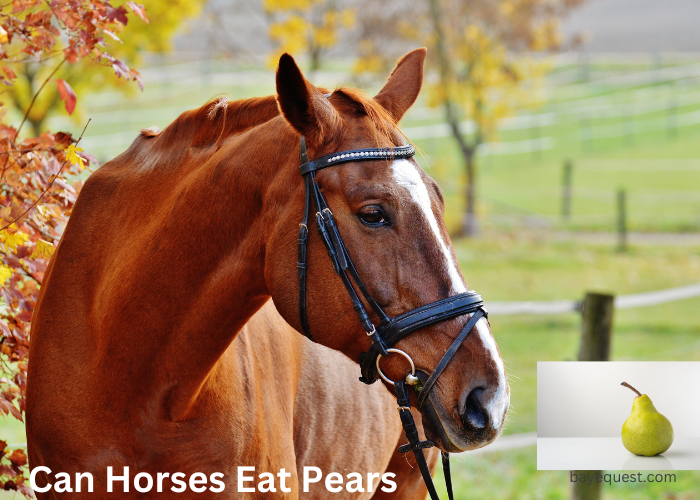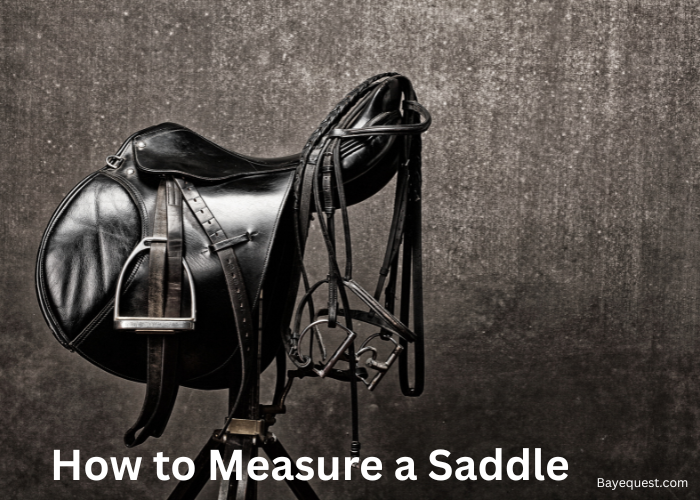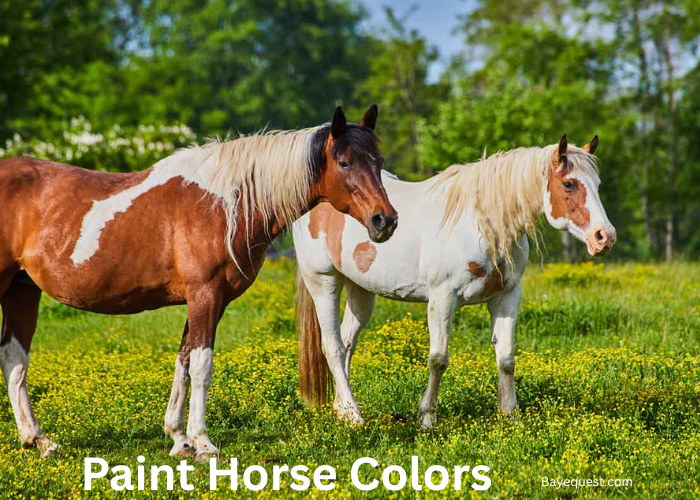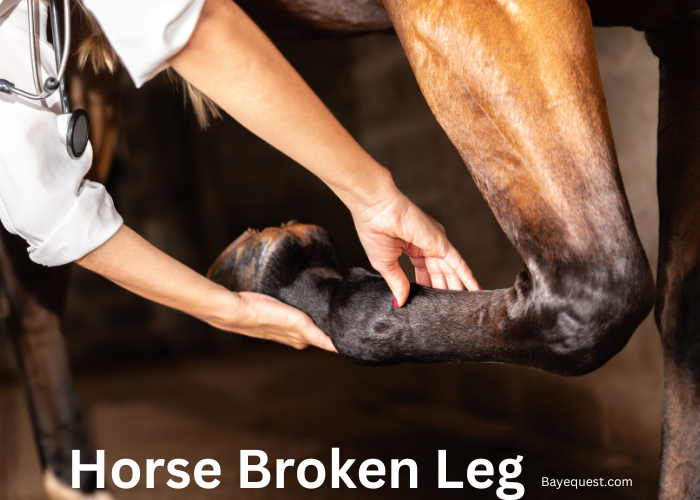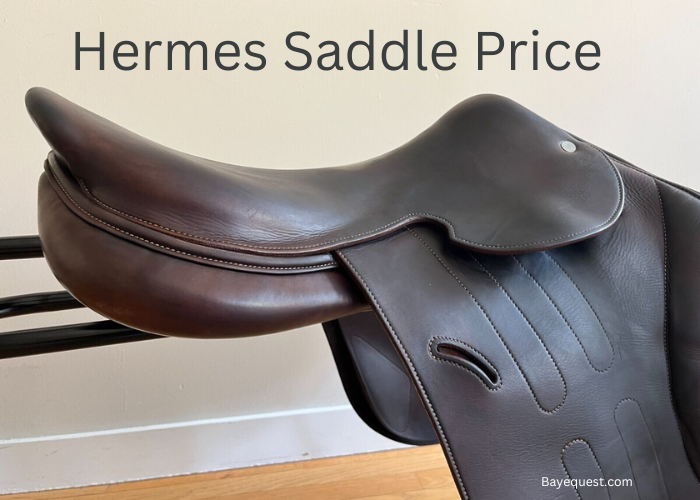Pears are sweet, juicy, and perfect for a summer snack—but what about for your horse? With so many treats to choose from, it’s good to know what’s safe and healthy for your equine friend.
Horses love a good snack, but not everything we eat is good for them. Are pears a treat they can enjoy, or should you think twice?
Let’s break it down and see if this fruity favorite makes the cut for your horse’s diet.
Can Horses Eat Pears? Key Takeaway
Yes, horses can eat pears. Just like us, horses can enjoy a variety of fruits, and pears are one of those sweet treats that can be a healthy snack for them. But, as with anything new you introduce to your horse’s diet, there are a few things to remember.
Are Pears Safe for Horses?
Yes, pears are safe for horses to eat, but there are a few things you should keep in mind to ensure their safe enjoyment of this treat.
First off, moderation is key. Pears are sweet and contain sugar, so they should only be a small part of your horse’s diet. Too much sugar can lead to health issues for your horse, like weight gain or even diabetes.
Before giving a pear to your horse, cut it into smaller pieces. This helps prevent choking hazards and makes it easier for the horse to digest.
Also, don’t forget to remove the seeds. Pear seeds contain traces of cyanide, which can be harmful in large quantities.
So, while pears can be a delicious and healthy snack for your horse, just remember to serve them safely.
Can Horses Have Pears Juice?
Sure, horses can have pear juice, but just like eating pears, you’d want to offer it in moderation. Pear juice is quite sugary, and too much sugar isn’t great for horses. It can lead to weight gain and other health issues if not managed properly.
When giving pear juice, consider it a special treat, not a regular part of their diet. A little can go a long way in making a horse happy without overdoing it.
Also, it’s smart to mix the juice with water to reduce the sugar content, making it a lighter treat. This way, your horse can enjoy the flavor without the risk of too much sugar.
Keep it occasional, and your horse can safely enjoy this sweet sip.
Can a Horse Eat Pear Seeds?
No, horses should not eat pear seeds. While the flesh of the pear is fine for horses, the seeds are a different story.
They contain a compound that can turn into cyanide when digested. Although it takes quite a few seeds to cause serious harm, the risk is not worth it.
Keep things safe and simple: remove the seeds before giving pears to your horse. This way, you avoid any potential problems, and your horse can enjoy the tasty, nutritious part of the pear without any worries.
Is the Pear Core Safe for a Horse to Eat?
No, it’s best not to let your horse eat the pear core. The core contains the seeds with compounds that can turn into cyanide when digested. Plus, the core can be tough and might pose a choking hazard.
Just stick to giving your horse the flesh of the pear. Make sure to cut it into small, manageable pieces to avoid risk. This way, you keep your horse’s snack time safe and enjoyable.
Are Pear Tree Leaves Safe for Horses?
Pear tree leaves aren’t the best choice for your horse. While they’re not the most toxic, they’re not completely safe either.
Like the seeds, the leaves can contain harmful compounds if eaten in large amounts. Keep your horse away from the pear tree altogether. Stick to feeding them the pear flesh, properly prepared without the core and seeds.
There are plenty of safer, more suitable options for greens that you can feed your horse.
Can Horses Eat Canned Pears?
Canned pears aren’t the best option for horses. The main issue is that canned pears often come soaked in syrup or added sugars, which isn’t good for your horse. Too much sugar can lead to health problems like obesity and dental issues.
Choose fresh ones if you want to share pears with your horse. Remove the core and seeds and cut the pears into small pieces to prevent choking.
This way, your horse gets a healthy treat without unnecessary sugars or additives.
How Many Pears Should I Give My Horse?
When it comes to feeding pears to your horse, less is more. Think of pears as a treat, not a main part of their diet.
Give your horse one or two small slices of pear a couple of times a week. This helps keep their sugar intake in check while letting them enjoy something sweet.
Always make sure the pears are fresh and cut into manageable pieces to avoid any risk of choking. And, of course, remove the seeds and core to keep things safe. This way, your horse gets a tasty treat without any health risks.
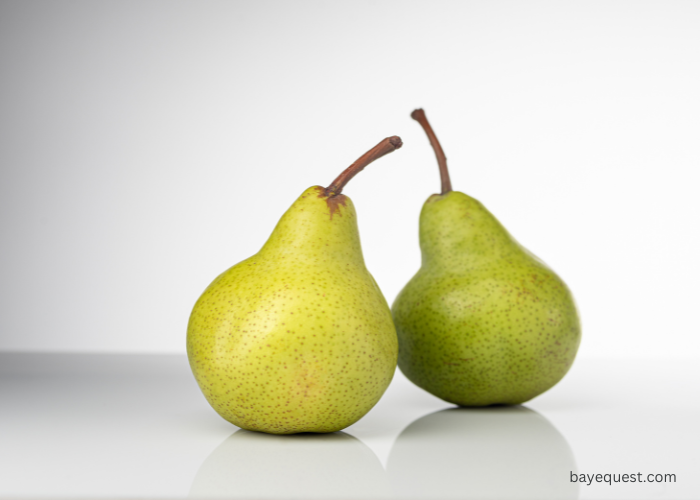
Benefits of Feeding Horses Pears
Feeding pears to horses can have some benefits, as long as it’s done in moderation. Here’s why giving your horse a pear now and then can be a good thing:
Hydration. Pears are high in water content, which can help keep your horse hydrated, especially during warmer months or after exercise.
Fiber. The dietary fiber in pears supports good digestive health in horses. It helps keep their gut moving and can prevent constipation.
Vitamins and minerals. Pears provide vitamins like Vitamin C, which can boost the immune system, and Vitamin K, which is important for bone health. The potassium in pears helps with muscle function and overall cellular function.
Low in fat. Pears are very low in fat, making them a healthy treat option that won’t contribute to unnecessary weight gain when appropriately fed.
Natural sugars. The natural sugars in pears can be a quick source of energy. These sugars are balanced with fiber, which helps prevent a rapid spike in blood sugar levels.
Nutritional Content of Pears
This table displays the approximate nutritional content of a medium-sized pear (about 178 grams):
| Nutrient | Amount |
| Calories | 101 kcal |
| Protein | 0.6 grams |
| Total Fat | 0.2 grams |
| Carbohydrates | 27 grams |
| Dietary Fiber | 6 grams |
| Sugars | 17 grams |
| Vitamin C | 7.5 mg (8% DV) |
| Vitamin K | 8.2 mcg (10% DV) |
| Potassium | 206 mg (4% DV) |
| Calcium | 16 mg (1% DV) |
| Iron | 0.2 mg (1% DV) |
DV is the Daily Value, which gives you an idea of how much a nutrient contributes to a daily diet. The percentages are based on a 2,000-calorie diet, which can vary depending on individual energy needs.
How to Introduce Pears to a Horse Safely
Introducing pears to your horse safely is pretty straightforward. Here’s how you can do it without any fuss:
Start small. Begin by offering a small piece of pear to see how your horse likes it and ensure no adverse reaction. Like us, every horse has its own likes and dislikes, and its body’s reaction can vary.
Prepare properly. Always remove the core and seeds from the pear before feeding it to your horse. These parts can be harmful. Cut the pear into manageable chunks to prevent any choking hazard.
Feed as a treat. Remember, pears should be given as a treat, not as a main part of your horse’s diet. Keep it to a couple of slices a couple of times a week at most. This helps prevent any issues from too much sugar.
Observe. After introducing pears, monitor your horse for signs of discomfort or digestive issues. If everything seems normal, you can make it a regular treat.
Variety is key. While pears can be a healthy treat, it’s important to maintain variety in your horse’s diet. This ensures they get all the nutrients they need from different sources.
How to Prepare Pears for Horses
Preparing pears for horses is easy and quick. Here’s how you can do it:
1. Wash the pear. Start by thoroughly washing the pear to remove pesticides or dirt from the skin.
2. Cut it up. Slice the pear into manageable pieces. This makes it easier for your horse to chew and digest.
3. Remove the core and seeds. Make sure to take out the core and any seeds. These parts can be harmful to horses if ingested.
4. Offer in moderation. Even though pears are safe for horses, they should only be given as a treat. A few pieces here, and there are plenty.
Pear Treat Ideas for Horses
Here are some fun and safe pear treat ideas for horses to keep things interesting and tasty:
1. Fresh pear slices. Simply cut a pear into slices, ensuring you remove the core and seeds, and offer them to your horse as a fresh treat. This is the simplest way to let your horse enjoy pears.
2. Pear and carrot mix. Mix chopped pear with carrot slices for a vitamin-rich snack. The combination of flavors will be a delightful treat for your horse.
3. Frozen pear cubes. During the hotter months, you can freeze pear slices or small cubes and give them to your horse as a refreshing and cooling treat. Just make sure they’re thawed enough to be chewable but still cool.
4. Pear mash. Make a soft pear mash for older horses or those with dental issues. Mix pear pieces with some water and mash them into a pulp. You can even add in some other horse-safe fruits for extra flavor.
5. Pear stuffing in a hay ball. If you use a hay ball or similar feeding toy, stuffing some pear slices into it can make for a fun and engaging treat. It encourages your horse to play and work for their snack.
6. Dried pear chips. If you have a dehydrator, you can create dried pear chips. These are easy to store and great for adding a little bit of a sweet treat to your horse’s diet without the messiness of fresh fruit.
Potential Risks of Feeding Pears to Horses
While pears can be a healthy treat for horses when given properly, there are a few potential risks to keep in mind:
Choking hazard. Large pieces of pear can pose a choking risk, especially if a horse tries to swallow them quickly. Always cut pears into small, manageable pieces.
Digestive issues. Introducing any new food, including pears in large quantities, can upset a horse’s digestive system, leading to colic or diarrhea. Always introduce pears gradually.
Sugar content. Pears contain natural sugars, which can be harmful in excess. Overfeeding pears can lead to weight gain and contribute to conditions like laminitis, or insulin resistance.
Cyanide in seeds. The seeds of pears contain amygdalin, which can convert into cyanide when metabolized. Although a horse would need to consume many seeds to be affected, it’s safest to remove them.
Pesticide exposure. If pears are not properly washed, they can carry pesticide residues that might harm horses. Always thoroughly wash pears before feeding them to your horse.
Allergic reactions. Though rare, horses can have allergies to specific fruits, including pears. If you notice any signs of an allergic reaction, stop feeding them and consult your veterinarian.
Horses that Should Not Eat Pears
Certain horses should avoid or consume pears cautiously due to specific health conditions or dietary needs. Here are some types of horses that might fall into this category:
Horses with metabolic issues
Horses with conditions like Equine Metabolic Syndrome or insulin resistance should avoid high-sugar fruits like pears. The natural sugars can exacerbate these conditions, leading to more severe health problems.
Overweight horses
Horses already overweight or prone to obesity should have a carefully controlled diet. Given the caloric content of pears, they might not be suitable for these horses as they can contribute to further weight gain.
Horses with dental problems
Older horses or those with dental issues might find it hard to chew even the softest pear slices. For these horses, any hard or fibrous food can cause discomfort or lead to choking.
Horses prone to laminitis
Horses with laminitis or at risk of developing it should avoid sugary treats, including pears. Laminitis is a painful condition of the hooves, and managing diet is crucial to prevent flare-ups.
Horses with a history of colic
Horses that frequently experience colic should have a stable and consistent diet. Introducing new foods, like pears, can sometimes disturb their gut balance and trigger a colic episode.
Other Safe Fruits for Horses to Eat
Horses can enjoy a variety of fruits as treats. Here are some other fruits that are generally safe for horses to eat:
- Apples. A classic favorite, apples are safe for horses, but they should be cored and cut into pieces to prevent choking.
- Bananas. Horses can eat the banana and its peel. Bananas are a good source of potassium.
- Carrots. Though not a fruit, carrots are often enjoyed just as much and can be given safely to horses.
- Grapes. These are fine in moderation but should be given sparingly due to their high sugar content.
- Watermelon. Horses can eat both the flesh and the rind of watermelon. It’s a great hydrating fruit, especially during the summer.
- Oranges. Oranges are safe for horses, but some may not like the citrus flavor. Ensure they are peeled and possibly sectioned.
- Strawberries. Like grapes, these are high in sugar but are safe in small quantities. (Also see: Can Horses Eat Sugar?)
- Blueberries. These small berries are packed with antioxidants and are easy for horses to eat.
- Pineapple. When peeled and cored, pineapple can be a delicious tropical treat for a horse.
- Mango. Before offering it to your horse, this fruit should be peeled and the pit removed.
FAQs
Can horses eat cabbage?
Yes, horses can eat cabbage, but they shouldn’t really eat it. Cabbage causes gas and bloating if consumed in large amounts. Find out more on our insightful blog “Should horses eat cabbage?”
Can horses have blueberries?
Yes, horses can have blueberries. They are a safe and healthy treat rich in antioxidants, vitamins, and fiber. Blueberries are also relatively low in sugar compared to other fruits, making them a suitable snack in moderation. Always feed them in reasonable quantities to avoid excessive sugar intake.
Related read: Can a horse eat blueberries?
Do Horses Eat Pears? Conclusion
Absolutely, they do. Just remember to serve them up the right way. Core and chop them into bite-sized pieces to keep your horse safe and happy.
Pears are a sweet little treat packed with good stuff like vitamins and fiber, perfect for an occasional snack. Keep it to a few slices, and you’ll have a happy horse with a healthy little twist to its diet.
Enjoy those moments of sharing a pear with your horse. It’s not just good for them, it’s a sweet way to bond. Happy feeding.




